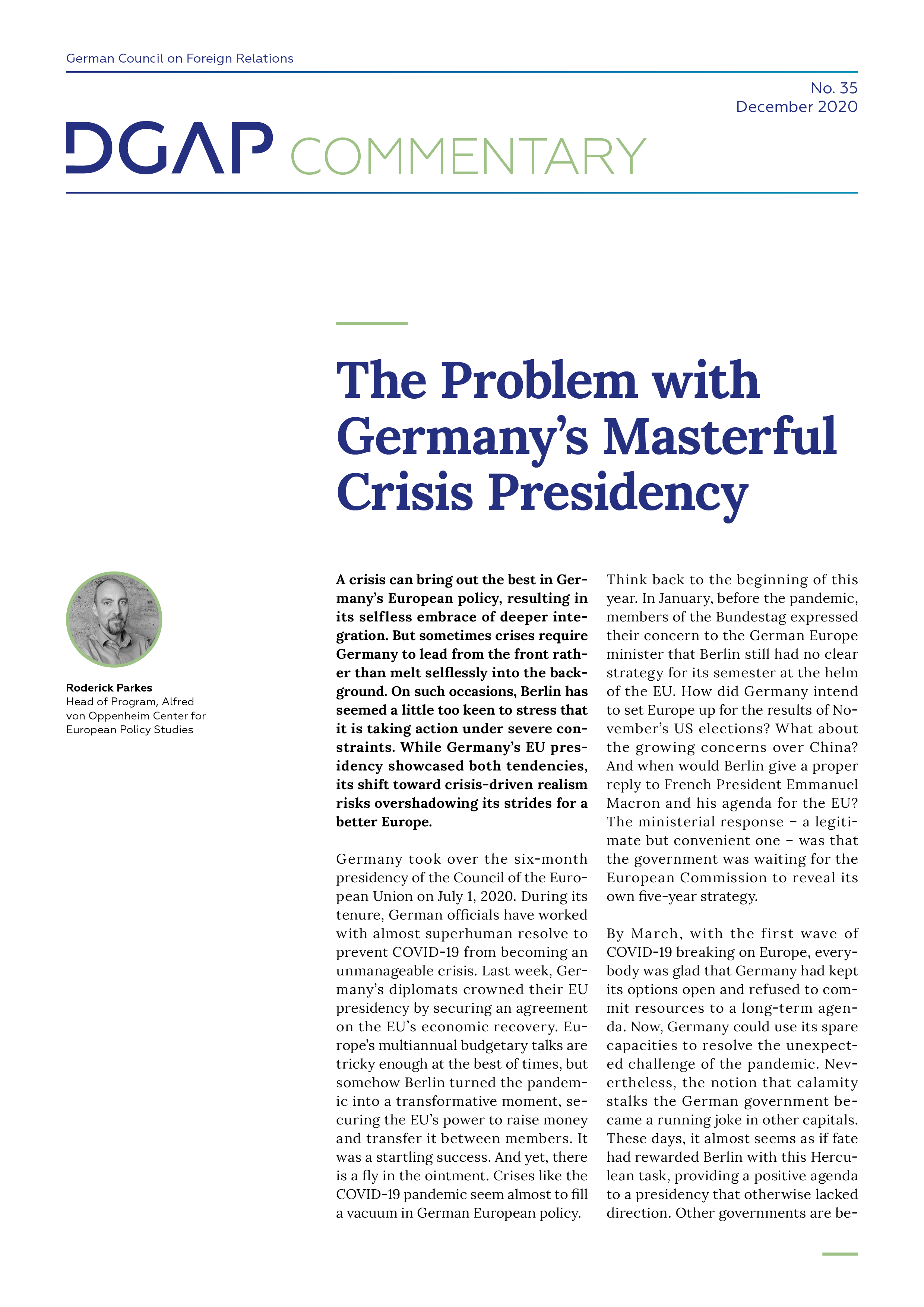Germany took over the six-month presidency of the Council of the European Union on July 1, 2020. During its tenure, German officials have worked with almost superhuman resolve to prevent COVID-19 from becoming an unmanageable crisis. Last week, Germany’s diplomats crowned their EU presidency by securing an agreement on the EU’s economic recovery. Europe’s multiannual budgetary talks are tricky enough at the best of times, but somehow Berlin turned the pandemic into a transformative moment, securing the EU’s power to raise money and transfer it between members. It was a startling success. And yet, there is a fly in the ointment. Crises like the COVID-19 pandemic seem almost to fill a vacuum in German European policy.
Think back to the beginning of this year. In January, before the pandemic, members of the Bundestag expressed their concern to the German Europe minister that Berlin still had no clear strategy for its semester at the helm of the EU. How did Germany intend to set Europe up for the results of November’s US elections? What about the growing concerns over China? And when would Berlin give a proper reply to French President Emmanuel Macron and his agenda for the EU? The ministerial response – a legitimate but convenient one – was that the government was waiting for the European Commission to reveal its own five-year strategy.
By March, with the first wave of COVID-19 breaking on Europe, everybody was glad that Germany had kept its options open and refused to commit resources to a long-term agenda. Now, Germany could use its spare capacities to resolve the unexpected challenge of the pandemic. Nevertheless, the notion that calamity stalks the German government became a running joke in other capitals. These days, it almost seems as if fate had rewarded Berlin with this Herculean task, providing a positive agenda to a presidency that otherwise lacked direction. Other governments are beginning to sense that Germany enjoys an existential European crisis just a little too much.
The New Demands of European Leadership
For decades, German governments have cheerfully slipped into a straitjacket, embracing the constraints the EU imposes. Germany’s commitment to fulfil the Treaty of Rome’s promise of an “ever closer union,” its historical responsibility toward eastern members, and the need to keep the Franco-German motor running have all obliged it to be selfless. This German selflessness has, in turn, frequently been indispensable to the big bang moments of Europe’s integration. This held true in 2020, too. This year, Berlin suppressed its own narrow interests to embrace the responsibilities of a crisis presidency. With EU budget talks on the agenda, Berlin embraced the role of honest broker despite the fact that Germany pays the lion’s share.
But the current international environment often requires a different kind of Germany: one that leads from the front rather than melting selflessly into the background. When the 2009 financial crisis first obliged Berlin to play that new kind of leadership role – combining its interests, values, and long-term plans in a more overt and proactive way – Germany failed. Ever since that experience, German policymakers have been running scared from their own propensity to moralize and overthink things. In today’s Berlin, a political culture has emerged that privileges doing over thinking and hard facts over abstract values.
A crisis can thus be liberating for Germany, providing an excuse for Berlin to shirk strategy and simply respond to facts. When big global shifts crystallize into acute crisis moments, Berlin has grounds to switch into a very narrow kind of realism. But that means that it is just as easy for Germany to cite the constraints of a crisis presidency in order to put the focus on its narrow interests as it is to justify an exemplary abnegation of those interests. The generous EU budget and the messy fudge of the rule of law mechanism are two sides of the same coin: Germany played up the constraints imposed by the crisis situation. In neither case did German policymakers move out of their comfort zone to define a strategic agenda.
Dial-a-Crisis
Other member states have noted that Germany changes its behavior under crisis conditions, and they have tried to use that insight for their own purposes. The United Kingdom, for instance, felt it would benefit if Germany was given an excuse to assert its raw business interests in the Brexit talks and so it tried to bring things to a head. In doing so, however, the UK misread how closely German business interests are allied to the integrity of the single market and how one-sided the crisis resulting from a hard Brexit would be. Nevertheless, the UK’s tactics show a readiness to “help” Germany toward a narrow realism.
The British were not the only ones to try this kind of trick. Again and again during the past six months, other governments manufactured crises in a bid to bounce Germany into action. France escalated tensions in the Eastern Mediterranean, for example, while Cyprus held the EU hostage on the introduction of sanctions against third countries. They too failed. Each time, Germany succeeded in quietly defusing tensions. The mistake of these governments was, perhaps, trying to push Germany in a more geopolitical direction – to have it act upon (their reading of) Europe’s shared interests and values.
Then came the crisis over the Rule of Law Mechanism and the EU budget. Poland and Hungary understood German interests well and provided Berlin with an excuse to step back from its principled stand on this issue by threatening to block the budget and flow of money to crisis-hit southern Europe. In late November, I co-wrote a DGAP policy brief that argued that this political crisis was not as acute as it appeared and that southern Europeans had other means to raise money. Our assessment was that southern members – not least Portugal, which is next in line for the EU presidency and did not fancy taking on this fight with Poland and Hungary – were happy to inflate the sense of crisis.
Ours was a contentious argument, of course, but the reaction it elicited here in Berlin was interesting. When we made the case to Germans that the budget crisis was being inflated and that they had strategic opportunities to steer the outcome, they soon cited another set of overarching constraints to justify an immediate compromise. They told us that it was now the climate crisis that demanded realism: if Germany played hardball with Poland, Poland might lose access to the EU cash allotted to green transformation. (When the summit discussed climate targets, it might be added, Poland duly rewarded Germany by taking these talks hostage too, excessively drawing out discussions when other pressing matters were on the table.)
Judging the Presidency
So how will Germany’s presidency be judged? It is both a little naïve and churlish to see its presidency as anything other than an overwhelming success – one achieved precisely by Germany’s readiness to put compromise ahead of grandstanding. Also, the notion that Germany somehow invited the recurrent political crises that popped up during its semester will appear very odd to its diplomats on the front line. And there is something rather wearisome about the constant calls for German leadership when Berlin shows this on a daily basis and other member states do not.
Yet, unfair as it may be to point it out, there remains something of a vacuum at the heart of German European strategy – and filling it is where Germany’s real obligation lies. To shirk this responsibility risks locking the EU into ever greater crises and ever smaller returns.
Moreover, there is a reason why the rule of law has become such a totemic issue for the EU. The current debate reflects the rise of China and system competition and raises the question of what happens if people lose faith in the EU’s commitment to European values. Academics, who for so long struggled to define “Euroskepticism,” now seem to agree that governments that reject the EU’s essential values – democracy and the rule of law – are Euroskeptic. But how long before voters demand their governments safeguard those essential values from the EU? How long before the Euroskeptics are the ones standing up for the rule of law? That is the day that the European Union is reduced to little more than a cash cow.



